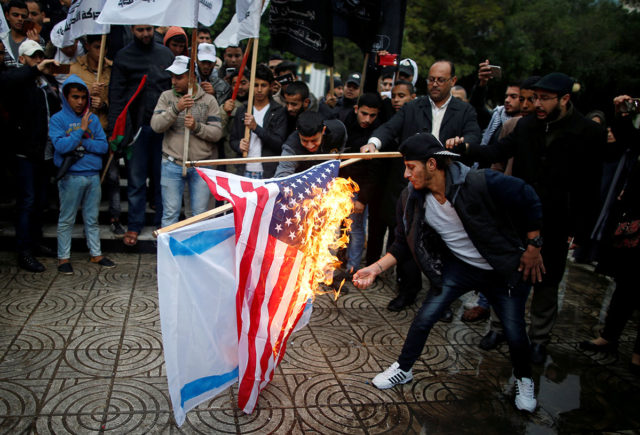
The Palestinian Authority (PA) has called for a “Day of Rage” to protest the opening of the American Embassy to Israel in Jerusalem. “Days of Rage” actually date to SDS activities in Chicago in 1969, but were resurrected for the 2011 uprising in Bahrain. They were seen in Syria, Iraq, Saudi Arabia and elsewhere in the Arab world, focused on governmental corruption and ineptitude. They serve a different purpose in the West Bank — driving a stake into the heart of the “peace process.”
That, for Abbas, is a worthwhile goal.
It is an article of faith in the West and at the United Nations that there is a “process” that can produce “peace” in the Middle East; it isn’t true. Israel and Abbas have incompatible bottom lines and Abbas has increasingly less room to maneuver against his real foes: Hamas, Turkey and Iran. The best he can do is stymie the process, which accounts for his vile outpouring of anti-Semitism and Holocaust denial last week, as well as the “stabbing intifada,” “days of rage,” and “pay for slay.”
For Israel, the goal is the promise of U.N. Security Council Resolution 242 that Israel will have “secure and recognized boundaries free from threats or acts of force.” From legitimacy and security, peace can emerge.
This presents Abbas with a dilemma. As the successor to Yasser Arafat, he is wedded to Arafat’s primary principles:
- Not to concede the legitimacy of Jewish national aspirations on land claimed by Arabs;
- Not to concede the resettlement of Palestinians — original 1947-49 refugees or their descendants — anywhere but within the boundaries of pre-1967 Israel.
The “two-state solution,” beloved of the professional peace-processing class, requires that he break both pledges to his mentor. And further, to make the above concessions requires Abbas to agree that Palestinian national aspirations will be forever satisfied with a split rump state squeezed in between a hostile Israel and a hostile Jordan. It requires Abbas to say:
“Okay, we were wrong and Jews are the indigenous people in this space, entitled to claim it as historic and national patrimony. Well, yes, the Galilee is Arab land, but we’re willing to concede it to the Jews in perpetuity. And yes, the coast from Haifa to Akko to Ashkelon to Gaza is Arab land, but we’re willing to give it to the Jews in perpetuity. And yes, Beer Sheva and the desert are Arab land, but we’re willing to concede it to the Jews in perpetuity. And yes, Jerusalem — specifically Haram esh-Sharf from which Muslims exiled the Jews — is Islamic, but we’re willing to concede sovereignty of our holiest place to the Jews.
“Oh, and by the way, in making these concessions to Jewish peoplehood and Jewish attachment to the land — the fundamental principle of U.N. Resolution 242 and Israel’s bottom line — we’re willing to get out in front of Saudi Arabia, Lebanon, Iraq, Kuwait and others who have not yet voiced that position even as they wiggle toward Israel.
“And more, we are willing to incur the wrath of Hamas, ISIS, al Qaeda, Qatar, and Iran because not only have they not done so, but they’re willing to fund open warfare against me or anyone else who does.”
Are you laughing yet? If not, consider this: While Abbas works to retain the mantle of Arafat, he is also fighting an open war with Hamas. It is assumed that this war is over the rules of engagement with Israel; it is not. It is over ruling the Palestinian people and their institutions. On the subject of Israel, they are in agreement.
The PLO Charter, the fundamental Palestinian document, asserts that “Palestine” exists within the boundaries of the British Mandate of Palestine (Article 2). That the establishment of Israel is “entirely illegal” (Article 19). That “armed struggle is the only way to liberate Palestine. Thus, it is the overall strategy, not merely a tactical phase” (Article 9). “The liberation of Palestine … aims at the elimination of Zionism in Palestine” (Article 15). There’s more if you need it.
The Hamas Charter, updated in 2017, had only a tactical disagreement:
Hamas rejects any alternative to the full and complete liberation of Palestine from the river to the sea (the Jordan to the Mediterranean) without compromising its rejection of the Zionist entity and without rejecting any Palestinian rights. (However) Hamas considers the establishment of a fully sovereign and independent Palestinian state with its capital in Jerusalem along the lines of the June 4th, 1967 Armistice line with the return of the refugees displaced from their homes in 1949 to be the formula of national consensus.
In other words, Hamas told the Palestinian Authority: “If you want to negotiate with the Zionists you can, but it won’t be the end of the war.” If the Palestinian Authority accepts a fully independent Palestinian state as a temporary measure that’s okay; Hamas agrees to accept whatever land is liberated. But only as a stage in pursuit of all of it.
And so, while the U.S.-led Quartet might have thought it was pressuring Israel to make political and territorial concessions to Abbas in the name of “peace,” Abbas rightly understood that the pressure was on him to keep Western money and Israeli security cooperation flowing, while maintaining the Arafat standard and not bringing the Hamas war down on his head. His response — at once reasonable, ugly, and desperate — is to try to change the subject to settlements, boycotts, U.N. membership, UNESCO, or anything else to drive the discussion away from his limitations and back to Israel.
It is getting harder. Abbas is caught among competing domestic interests and an American administration finally willing to shake up long-held positions.
Abbas has become so desperate he is willing to go full, raving anti-Semite and anti-American at the same time.

